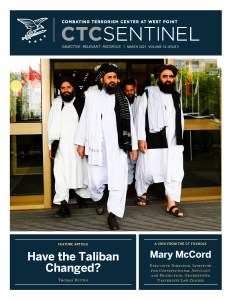From the Editor
President Biden soon has to decide whether to withdraw the remaining 2,500 U.S. troops from Afghanistan to meet a May 1 deadline agreed to by the previous administration. With time ticking down, the Biden administration has launched a major diplomatic push to broker a peace settlement for Afghanistan. As noted by Thomas Ruttig in this month’s feature article, “Whether and how much the Taliban have changed since their repressive rule over Afghanistan before the fall of 2001 is key to whether a potential peace settlement can create a social and political landscape in Afghanistan that is acceptable to the people of Afghanistan, as well as the United States and NATO allies.” Ruttig assesses that “While the Taliban have softened their rhetoric on some issues (for example, on women’s rights and education) and there is evidence of real policy change in certain areas (for example, on the use of media, in the education sector, a greater acceptance of NGOs, and an acceptance that a future political system will need to accommodate at least some of their political rivals), their policy adjustments appear to have been largely driven by political imperatives rather than any fundamental changes in ideology.” He assesses that “Whether some changes in approach will be perpetuated will depend on the ability of Afghan communities and political groups to maintain pressure on the Taliban. This, in turn, depends on continued international attention toward Afghanistan.”
Brian Michael Jenkins, in a feature commentary, examines several possible courses of action the Biden administration could take if the U.S. efforts to broker a peace settlement in Afghanistan do not result in a major breakthrough in the coming weeks. He writes: “What makes a decision on which path to follow so difficult is that each option carries a high risk of resulting in bad outcomes.” He notes that “Decisive action always looks good, but a turbulent world also means calculating risks, avoiding unintended consequences, and hedging bets.”
This month’s interview is with Mary McCord, the executive director of the Institute for Constitutional Advocacy and Protection at the Georgetown University Law Center, whose previous service in government included working as Acting Assistant Attorney General for National Security at the U.S. Department of Justice from 2016 to 2017. She offers insights on the heightened threat of far-right extremist violence in the United States and how the country’s legal architecture could evolve to counter it.
Douglas Weeks argues that there is “too much pessimism” in the United Kingdom about the possibility of deradicalizing terrorist offenders. He writes: “To address the root causes of the threat, the United Kingdom needs to learn lessons from what has worked for successful ‘deradicalization’ mentors and empower their efforts.”
Paul Cruickshank, Editor in Chief
 Skip to content
Skip to content

